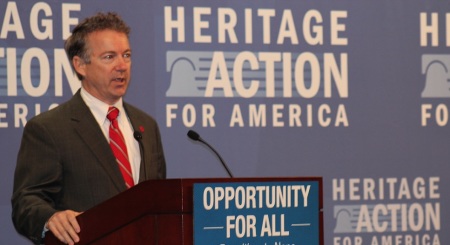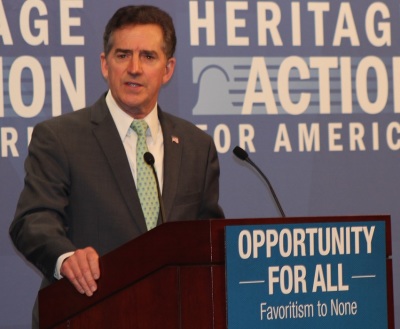Rand Paul: Judicial Activism Can be a Good Thing

WASHINGTON – United States Senator Rand Paul stated that "judicial activism" can be a force of good in American politics.
At an event sponsored by the conservative group the Heritage Action for America, the outspoken libertarian-leaning Republican told those gathered Tuesday morning that judicial activism can play a positive role in public policy.
"There is a role for the Supreme Court to mete out justice. The Fourteenth Amendment gives the Supreme Court, gives the federal government a role in saying the states can't do certain things," said Sen. Paul.
"I think the federal government was right to overturn state governments that were saying that 'separate but equal' was fine'."
Paul believes that the conservative position that judicial restraint was intrinsically beneficial was wrong given the need for decisions to combat state-level wrongs like Jim Crow legislation.
"If you're for judicial restraint, I guess then what happens when a legislature does bad things?" asked Paul to an audience that has often expressed support for restraint over activism.
"What happens when a legislature says 'well, we're going to pass Jim Crow laws' … should we have an activist court that comes in and overturns that?"

Paul's remarks were part of an annual event hosted by Heritage Action for America called the Conservative Policy Summit.
A multiday event featuring various speakers covering policy issues ranging from national defense to the definition of marriage, the theme for this year was "Opportunity for All, Favoritism for None."
Former Senator Jim DeMint, current president of the Heritage Foundation, formally introduced Paul on Tuesday morning before an audience both in person and online.
"When he was running for office, the Washington establishment was afraid that if he got here he would cause trouble. Their fears have been well-founded," said DeMint.
"I'm very proud that I supported him when it wasn't cool. I was told I was stupid, he couldn't get elected and I'm grateful that he has proved all of the critics wrong."
DeMint argued that Paul represented the proper "welding" of conservative and libertarian views, which he believed represented the best majority for the country.
"The only majority that's left for freedom-minded Americans is a majority that comes from welding a lot of the libertarian ideas with conservative ideas," said DeMint to those gathered.
"I believe that the libertarian concepts of individualism, self-reliance, free-markets are certainly consistent with the foundation of conservative thought. And if we could weld with those libertarian foundations the conservative values that build a strong society and the guarantees of a strong defense, then we will have a majority of Americans who understand how we build a stronger country."
Paul was not the only member of Congress who gave remarks at the Summit. U.S. Senator Ted Cruz of Texas gave remarks to attendees at the Summit on Monday regarding policy ideas he sought to have happen at the federal level.
These included repealing "Obamacare" and Common Core standards, securing the American border, imposing congressional term limits, and simplifying the tax code.
Believing that restraint and activism could both be justified, Paul told those gathered that he supported what author Randy Barnett called a "presumption of liberty."
"I liken it to sort of saying, well maybe we should be presumed innocent until found guilty; maybe we should presume to be free until we are restricted," said Paul.
"We simply don't want judges writing laws. I don't want judges writing laws either; but do I want judges to protect my freedom? Do I want judges to take an activist role in defense of liberty?"





















